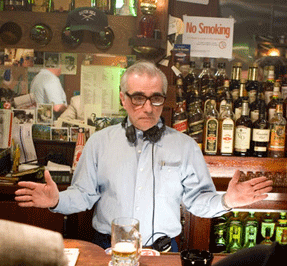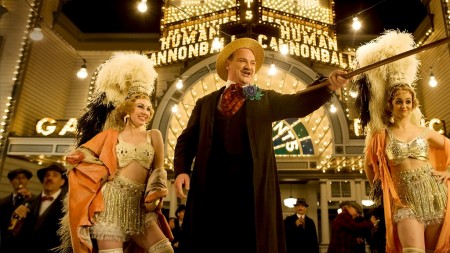“Broadway Empire,” the biggest new TV show of the season, which starts tonight, began as a suggestion from HBO to a writer who had already spent years writing about New Jersey gangsters.
“Toward the end of ‘The Sopranos,’” Terence Winter told writers at the TV Critics Press Tour in Los Angeles last month, “HBO came to me with a book that Mark Wahlberg and his partner Steve Levinson had optioned, ‘Boardwalk Empire,’ which the series is inspired by, has a history of Atlantic City.
“And they said, ‘Why don’t you read it and see if there’s something in there that feels like a series to you.’ And almost literally on the way out the door, they said, ‘Oh, and by the way, Martin Scorsese is attached to this if you find a series there.’ So I said, ‘I assure you I will find a series here.’”
And so they did – the biggest, most lavish and likely most entertaining saga on TV in years. And the first series to lure the celebrated Scorsese to television.
 Scorsese, left, appearing via satellite before reporters at the TV Critics Press Tour last month in Los Angeles, had long admired the work on HBO. And he says, “I’ve been tempted over the years to be involved in one of them because the nature of the long form and the development of character and plot.”
Scorsese, left, appearing via satellite before reporters at the TV Critics Press Tour last month in Los Angeles, had long admired the work on HBO. And he says, “I’ve been tempted over the years to be involved in one of them because the nature of the long form and the development of character and plot.”
And even in a show with a number of episodes, he says he was struck by their quality. “They’re thoughtful, intelligent, and brilliantly put together. And it’s a new opportunity for storytelling, really, which is very different from television in the past. So this was my inroad, so to speak, is my temptation to do this sort of thing and be involved with it.”
Winter, for his part, was compelled from the start.
“I was always interested in the 1920s and the gangster world in general,” he says. And as he read the book, “Boardwalk Empire: The Birth, High Times and Corruption of Atlantic City” by Nelson Johnson, “there were a couple of years in particular that were very interesting, and the ’20s being the most interesting to me because it was an era that hasn’t really been depicted often in cinema, and almost never in television. And at its center was this incredible lead character, Nucky Johnson.”
By title, the county treasurer wouldn’t usually be seen as such a power broker. “But this was a guy who was just incredibly conflicted, equal parts politician and gangster, and then coupled with the massive changes going on in 1920, prohibition, women’s vote, broadcast radio coming in, World War I just having ended, the ’20s about to boom. It was just this incredible pallet from which to draw stories and characters. It was just irresistible.”
Winter focused just on the slice that covered the 1920s and the start of Prohibition. “And then it was really a question of really just fictionalizing Nucky and his world and the people he may or may not have interacted with.
For Scorsese, “I just sort of visualized it as best I could under the circumstances and the way I normally would with a feature film. But for me the ’20s are very special because when I was growing up in the late ’40s, early ’50s, the ’20s was only maybe 15, 20 years [behind] us, and my father and mother spoke about it as if it was the present ay. So this is something that I felt very comfortable with.”
“One of the things that was interesting about this era and this character, in particular, is that Nucky really moved seamlessly between the worlds of politics and organized crime,” Winter says. “And his white collar corruption slowly gave way to actual, you know, more of the hands-on violence that ensued with Prohibition. Again, it was almost too good to pass up if you were corrupt and had a corrupt bone in your body and you happened to run a town that was on the ocean, you know, it was almost impossible not to be involved in Prohibition, and in some ways — or involved in illegal rum-running during Prohibition is what I meant to say. And also, if you weren’t predisposed to do that, people would kill you to get you out of the way so they could do it.”
Of course there are similarities to the modern New Jersey crime bosses of “The Sopranos” where “Boardwalk Empire” star Steve Buscemi worked in front and behind the cameras, directing some of its most memorable episodes.
“There’s a certain type of person drawn to the gangster world,” Winter says. “They’re generally young men who were predisposed to violence and risk-taking who like to make a lot of money quickly and wear flashy clothes. And it’s the same thing, I think, through the present day. It’s very similar. I mean, a lot of the parallels that exist between 1920 and today are evident. The more research I did and the more we wrote the series, the more I said, ‘God, it hasn’t changed a bit.’”
For Scorsese, it provides another thread in the tapestry of gangster films he’s made representing different eras.
“I think it’s the charting of this world, of the underworld, really, as in “Mean Streets” and ‘GoodFellas.’ And ‘Casino.’ The film ‘Casino’ in 1995 took, in a sense, ‘GoodFellas’ — in the style of it, but in ‘GoodFellas’ there was still street corners. It was still smaller in a way. ‘Casino’ was a bigger world. It went out to Las Vegas. For me, it’s the charting of the nature of this world, the underworld, and particularly, we went back to ‘Gangs of New York’ and what New York City was like, the major urban areas.”
There is also, Scorsese sys, “the nature of America’s love affair with the gangster as a sort of tragic hero, you know, the famous Warshaw essay and the immediate experience where he describes loving the gangster for doing everything that he can’t do, but wanting him to pay for it at the end.”
In the influential 1948 essay, “The Gangster as Tragic Hero,” Robert Warshaw says a gangster, as romantic outsider,
appeals to that side of all of us which refuses to believe in the ‘normal’ possibilities of happiness and achievement; the gangster is the ‘no’ to that great American ‘yes’ which is stamped so big over our official culture and yet has so little to do with the way we really feel about our lives.
“I think Warshaw was writing about it from films like ‘Public Enemy’ and ‘White Heat,’ pictures that are the classic ones,” Scorsese says.
The research for “Boardwalk Empire” went much deeper.
“We try to be as historically accurate as possible,” Winter says. “I can’t give you an actual percentage, but I would say we’re running in high 90s in terms of historical accuracy. There were a couple of occasions where events did not take place on exactly the day or month that they took place, but in terms of storytelling, taking creative license, they don’t alter history in such a huge way that I was reluctant to do it.
“Even some of the very small, detailed events — when a movie opened, particularly, or even things like in episode two, a show is referenced, ‘The Hottentot’ — that was actually playing in Atlantic City in January of 1920. So everything from the Republican convention in 1920 to what movie was playing that week, we try to be as accurate as possible. I think it’s fun, and it’s sort of a challenge, but I think it’s ultimately much more satisfying for everybody if you can get it right.
“The challenges,” he says, “were fictional characters interacting with historical, real people.”
And big change occurred when they switched the surname of Nucky Johnson to Nucky Thompson in the series.
“I was afraid that, if people started to Google the real Nucky Johnson, they would become ahead of the story, and they would know what became of Nucky or when did he live and die or what he did or didn’t do. And I thought we had enough real people on the show that I was beholden to their reality. I didn’t want to box myself into the same corner creatively by having to say, ‘All right. Well, this Nucky did that or this.’ So by making him Nucky Thompson, he’s Nucky, but he’s not Nucky. Our Nucky can do anything and veer off into any directions, and it’s much more freeing creatively for myself and my writers. We can just sort of open it up.”

Nucky Days: Scorsese Does 'Boardwalk Empire' | ROGER CATLIN…
I found your entry interesting do I’ve added a Trackback to it on my weblog :)…
[…] Nucky Days: Scorsese Does 'Boardwalk Empire' | ROGER CATLIN […]